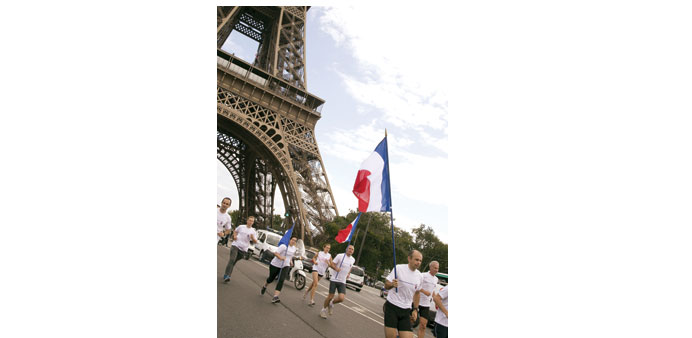DPA/AFP/Paris
A week of events commemorating the World War II liberation of Paris from Nazi rule 70 years ago began yesterday with a ceremony honouring the police who took up arms against the Germans while waiting for French and Allied forces to arrive.
On August 19, 1944, more than 2,000 officers wearing civilian clothing seized control of the headquarters of the Paris police from the collaborationist Vichy regime, and hoisted the French flag.
The seizure of the building marked the beginning of a week-long battle for Paris, which ended when Allied forces led by the French 2nd Armoured Division under General Philippe Leclerc entered the capital.
Paying tribute to the insurgent police officers at a ceremony at the police building in the heart of Paris, Prime Minister Manuel Valls said: “Here, in this spot, the Paris police played a full part in the restoration of our institutions and of our democratic ideal.”
“Here, police officers wrote a glorious chapter,” said Valls, who was previously the interior minister with responsibility for the police.
While the Marseillaise national anthem resounded around the police headquarters, Valls laid a wreath to the memory of the 167 officers killed during the liberation and hailed “those who stood up to barbarism”.
“The police headquarters became the first public building to be liberated, the symbol of a republican order restored, the beginning of the fightback,” Valls said.
“Here, 70 years ago, the Paris police played its part in restoring our institutions and our democratic and republican ideals, which it should never have abandoned,” he added.
This was a reference to a police force which largely co-operated with the Nazi occupiers, notably in rounding up around 13,000 of the city’s Jews, including 4,000 children, for deportation to the death camps.
The prime minister said that was “a moment where France lost her honour”.
The role of the police in liberating the city marked the first step in a process to restore the reputation of the force.
David Leiba’s mother was among around 76,000 Jews living in France who were deported to Nazi concentration camps.
Leiba, who was a teenager at the time, went on to join the Resistance.
In August 1944 he joined the battle around the police headquarters, firing on German convoys as they scrambled to retreat.
He also helped arrest high-profile collaborators.
Speaking to reporters at yesterday’s ceremony, the dapper 90-year-old, who wore a pin-striped suit and the blue, white and red armband of the Resistance, recalled the euphoria that followed the announcement by General Charles de Gaulle on August 25, 1944 of the liberation of Paris.
“It was extraordinary. All night long, people wandered the streets laughing and singing. As for me, I had only one desire and that was to find the young girl that I was seeing at the time,” he said.
Elka Melcer went on to become his wife. She died in 2013.
Later yesterday, the French flag was hoisted successively at the police headquarters, the Notre-Dame Cathedral, the Eiffel Tower and finally the Arc de Triomphe, to honour those who died liberating the city.
The celebrations will culminate in a “public ball” outside City Hall on August 25, replicating the spontaneous dancing that greeted Paris’s liberation seven decades ago.

People hold French flags during a ceremony conducted to celebrate the 70th anniversary of the Liberation of Paris, taking place near the Eiffel tower.
